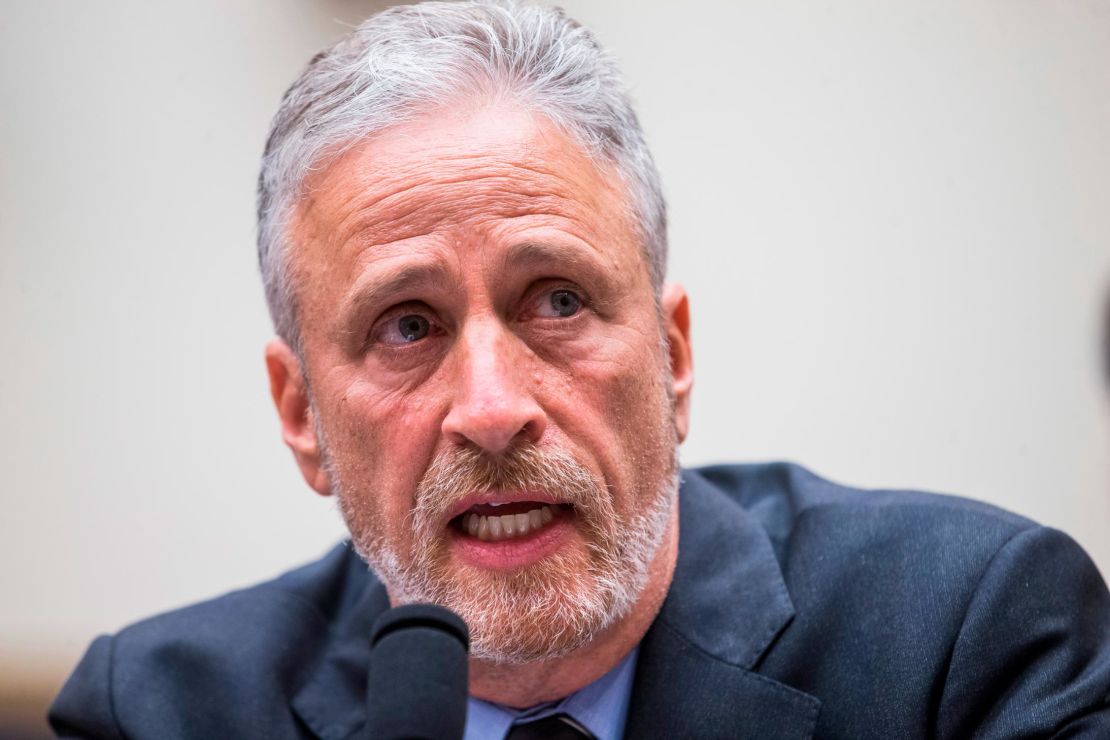Having kept a relatively low profile since leaving “The Daily Show,” Jon Stewart made headlines again this week, delivering an impassioned plea for 9/11 first responders during an emotional congressional hearing.
It wasn’t the first time that a Stewart clip in which he urged an institution to do better has gone viral. In fact, it was 15 years ago when he specifically took CNN and the wider media to task in an appearance on the debate show “Crossfire,” which effectively served notice that despite the primary mandate to entertain, late-night comedians needn’t shy away from more serious critiques and policy positions that propelled their monologues into the political conversation.
What a 9/11 first responder whispered to Jon Stewart before he choked up
“Crossfire” hosts Paul Begala and Tucker Carlson were clearly taken aback by the message that Stewart came to deliver. After some opening pleasantries, he called the show “bad,” compared it to pro wrestling and urged the hosts to “stop hurting America.”
“What you do is not honest,” Stewart said, accusing the two of engaging in “partisan hackery” that reduced politics to theater.
When Carlson essentially pleaded with Stewart to stop lecturing them and “be funny,” the comic responded that he wasn’t “going to be your monkey.”
Stewart closed by calling Carlson a somewhat crude name, which is perhaps the best remembered and least significant part of the exchange. The larger point – that turning political dialogue into a kind of sporting event had consequences – was somewhat overlooked in the uncomfortable banter that ensued.
Begala would later write – somewhat hyperbolically – that Stewart “blew up” the show, while acknowledging that some of his criticisms were valid and dismissing others. For his part, Carlson went on to a stint at MSNBC before landing at Fox News, where he has found considerable success engaging in precisely the kind of political theater that Stewart decried.
Stewart, David Letterman and Jay Leno had all shown their more serious sides in the wake of the Sept. 11 attacks, and Letterman became a more outspoken political voice in his later years – a departure from Johnny Carson’s famous evenhandedness, where nobody was supposed to know where he personally stood based on his monologues.

Still, Stewart’s “Daily Show” tenure contributed to the understanding that comedians could do more than just “be funny,” providing compelling voices in exposing media excesses, especially in those places where the theater of it all becomes indistinguishable from the news.
In an op-ed when Stewart announced he was leaving “The Daily Show” in 2015, CNN’s Stephen Collinson observed that the comic had “carved out a unique place at the intersection of politics, entertainment and journalism.”
What Stewart did do, both on “Crossfire” and in his 16 years at Comedy Central, is take the media and political classes to task and seek to hold them accountable. That hardly makes him a pioneer among political comedians, but his TV showcase helped pave the way and stoke the appetite for others – including “Daily Show” alumni Stephen Colbert, Samantha Bee, Trevor Noah and John Oliver – to do the same.
While “Crossfire” brought Stewart on seeking a respite from sober discussion, the fruits of his efforts have been seen not just in the way the media now regularly recirculate and report how comics address key issues, but ABC’s Jimmy Kimmel using his latenight platform to become a focal point of the healthcare debate.
Looking back, Stewart might not have been anyone’s “monkey,” but for any kind of primate, that’s a pretty impressive trick.


